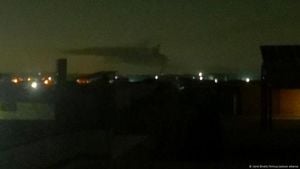In a dramatic escalation of tensions between India and Pakistan, Indian forces launched missile strikes early on May 7, 2025, targeting multiple locations across Pakistani territory, including areas within Pakistani-administered Kashmir. This military operation, which lasted just 25 minutes, reportedly killed at least eight people and has raised concerns about a potential wider conflict between the two nuclear-armed neighbors.
The strikes were carried out between 01:05 and 01:30 Indian time (or 02:35-03:00 Thailand time), hitting nine sites that India claims were linked to militant groups. Indian officials allege that these locations were training camps for groups such as Lashkar-e-Taiba (LeT), Jaish-e-Mohammed, and Hizbul Mujahideen, which they hold responsible for a recent attack on Indian tourists in Pahalgam, Kashmir.
Pakistan's military responded by asserting that only six locations were struck and claimed to have downed five Indian aircraft, including a drone. These assertions remain unverified by Indian sources. The Pakistani government has also condemned the strikes, labeling them as attacks on civilian infrastructure.
This latest incident marks a significant escalation in hostilities, reminiscent of previous confrontations. In 2016, India conducted surgical strikes following an attack in Uri, and in 2019, a suicide bombing in Pulwama led to airstrikes in Balakot, the first time India crossed into Pakistani territory since 1971.
Experts are divided on the implications of this military action. Ajay Bisaria, a former Indian High Commissioner to Pakistan, characterized the strikes as a calculated move by India to deter terrorism while sending a clear message to Pakistan regarding its support for militant groups. He stated, "The aim is to create deterrence by targeting known terrorist hideouts and sending a strong message to reduce tensions."
However, the broader geopolitical implications remain uncertain. Srinath Raghavan, a historian based in Delhi, noted that this operation is geographically more expansive than previous strikes, indicating a shift in India's military strategy. He remarked, "This time, India has targeted deeper into Punjab, aiming at the infrastructure of terrorist groups and sending a wider signal that these groups are now in India's crosshairs."
On the Pakistani side, analysts express concern over the potential for retaliation. Ejaz Hussain, a political and military analyst from Lahore, suggested that the Indian strikes were anticipated given the rising tensions. He stated, "The discourse from the Pakistani military indicates a commitment to respond, possibly with airstrikes across the border in the coming days."
Despite the risks of escalating violence, some experts maintain that a diplomatic resolution could still be possible. Christopher Clary, a political analyst at the University of Albany, suggested that a single retaliatory strike might defuse the situation, provided it does not lead to further exchanges of fire along the Line of Control (LoC).
The situation is further complicated by domestic political dynamics in Pakistan, where public support for the military has waned compared to previous years. Umar Farooq, a political analyst in Islamabad, warned that the current political climate, marked by significant unrest and the imprisonment of former Prime Minister Imran Khan, could lead to increased pressure on the military to act decisively. He noted, "If public sentiment in Punjab, which has historically been anti-India, grows stronger, we may see calls for military action that could escalate the conflict further."
As the dust settles from the latest attacks, both nations find themselves at a precarious juncture. The Indian government has taken further steps to reinforce its position, including closing key border crossings, suspending water-sharing agreements, and expelling Pakistani diplomats. Meanwhile, Pakistan has responded by suspending the 1972 peace treaty and implementing its own countermeasures.
The region is currently experiencing heightened military activity, with both sides exchanging artillery fire along the contested frontier. Indian forces are on high alert in the LoC sector, particularly in Uri, Jammu and Kashmir, where civilians have already been affected by cross-border shelling.
Looking ahead, the potential for a diplomatic resolution remains uncertain. While both countries have previously engaged in talks to de-escalate tensions, the current climate suggests that the road to peace may be fraught with challenges. Experts warn that if hostilities continue to escalate, the situation could spiral out of control, leading to a conflict that neither side desires.
As the world watches closely, the question remains: can India and Pakistan navigate this latest crisis without plunging into a deeper conflict? The stakes are high, and the consequences of miscalculation could be dire for both nations and the broader region.



